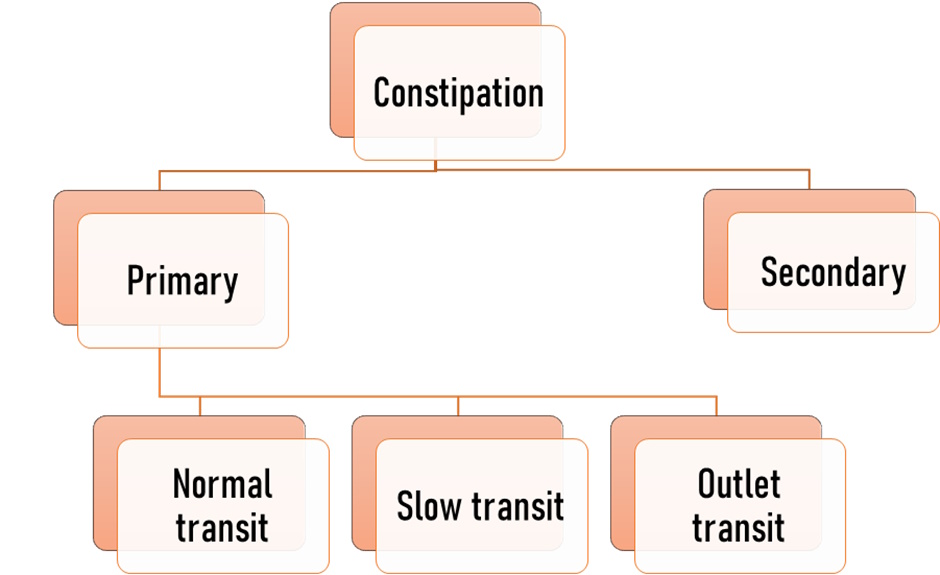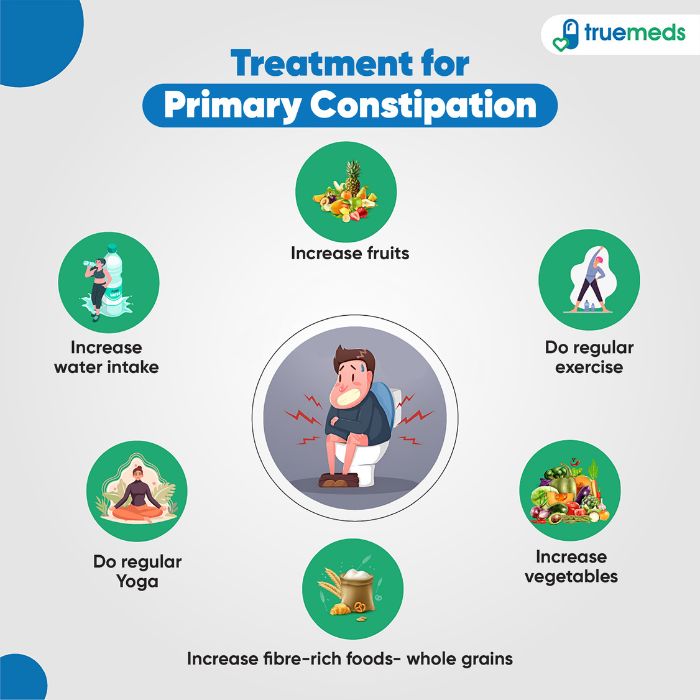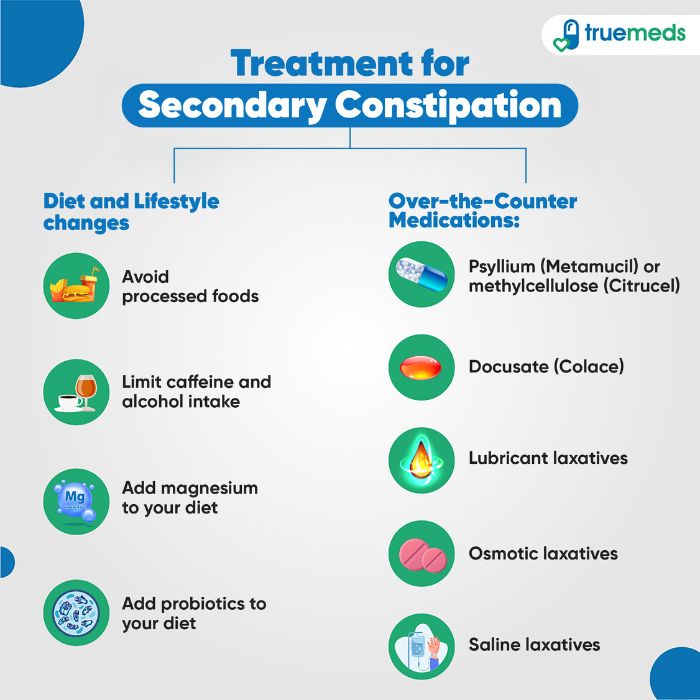What Are the Different Types of Constipation? Causes and Treatments
Last updated on : 03 Feb, 2025
Read time : 10 min
Constipation is a common digestive issue that can cause discomfort and disrupt daily life. It affects people of all ages and can significantly reduce quality of life. Various factors contribute to constipation, including changes in diet, lifestyle, medications, and underlying health conditions. Identifying the root cause is crucial for selecting the right treatment. Depending on the type of constipation, treatment plans may differ and often include lifestyle changes like increasing fiber intake and staying hydrated.
Understanding the different types of constipation is key to addressing the problem effectively. Let’s explore these types and their specific causes, symptoms, and treatments.
Types of Constipation
The two main types of constipation: primary (also known as functional) and secondary. The symptoms and treatments can vary depending on the type.
Below are the different types of constipation:

1) Primary Constipation
Primary or functional constipation is a common digestive problem characterised by infrequent or difficult bowel movements that are not caused due to any underlying medical conditions. Various factors, including poor diet, inadequate fluid intake, lack of exercise, and certain medications, can cause primary constipation. It’s further classified into:
a) Normal transit constipation
- It is the most common form of constipation.
- The person might feel constipated, but the stool consistency is normal.
- Through the digestive tract, the stool moves out at a normal pace.
- The frequency of passing the stool might be normal.
- However, the complaints of patients include difficulty with evacuation, bloating, pain or discomfort in the abdomen, and hard stools.
- The symptoms of this type of constipation overlap with the symptoms of irritable bowel syndrome (intestinal disorder).
Read more: Best Home Remedies to Get Rid of Bloating
b) Slow transit constipation
- Slow transit constipation is a rare form of constipation, mainly in middle-aged females.
- People having this type of constipation do not experience peristalsis, which is an inability to experience normal stimulation of the bowels after eating.
- Due to peristalsis, the food moves more slowly than usual in the digestive tract, and the time taken by stools to pass through the colon is much longer.
- Less frequent bowel movements are seen due to the reason that stools sit longer in the intestines.
c) Outlet constipation
- Outlet constipation occurs when there is damage to the muscles or nerves of the pelvic floor.
- The person experiences difficulty in passing the stools.
- Symptoms of outlet constipation include straining during bowel movements, delay in bowel movements due to pain, and feeling the need of use of hands to assist the bowel movements.
- A dyssynergic defecation is a form of outlet dysunction in which there is inadequate relaxation of anorectal muscles (muscles which control the release of stools from the body) while attempting to pass a bowel movement.
Treatment for Primary Constipation

Treatment for normal and slow constipation includes
- Increase your consumption of fibre-rich foods like whole grains, fruits, and vegetables.
- Increase intake of water.
- Do regular yoga & exercise.
- Use of laxatives (medicines used to relieve constipation)
Treatment of outlet constipation
- Pelvic floor muscle training involves exercises that help strengthen the pelvic muscles, relax them, and improve bowel movements.
- Biofeedback therapy: A probe is inserted into the anal sphincter (group of muscles at the end of the rectum) by a trained therapist, and visual or verbal feedback is given to the person to use the pelvic floor muscles and anal sphincter during bowel movements which help the person to improve the coordination by restraining the pelvic floor muscles.
- Adjunctive Therapies: Therapies like laxatives and enemas are given for the treatment of outlet constipation.
- Surgery: In severe cases of outlet constipation, surgery is done for the muscles around the anal sphincter.
2) Secondary Constipation
Secondary constipation is another type of constipation that occurs as a side effect of taking medications or due to an underlying medical condition. According to a study in the Neurogastroenterology and Motility journal, the following are the most common causes of secondary constipation:
Causes of secondary constipation
The common Causes of secondary constipation are:
- Neurological disorders such as spinal cord injury, Parkinson’s disease
- Endocrine or metabolic disorders such as diabetes mellitus, hypothyroidism, pregnancy
- Organic causes such as colorectal cancer
- Medicines such as tricyclic antidepressants, opiates, iron preparations
- Diet or lifestyle such as low fibre diet, inactive lifestyle, dehydration
Treatment of Secondary Constipation

You can effectively manage constipation through lifestyle and dietary changes. These include:
- Hydration: Ensure you drink enough water, as dehydration can contribute to constipation. Have at least eight glasses of water per day.
- Fibre: Increase your fibre intake by eating more fruits, vegetables, and whole grains. It will add bulk to your stool and help it move quickly through your intestines.
- Exercise: Regular physical activity can help stimulate your digestive system and alleviate constipation. Work out at least 30 minutes a day to avoid constipation.
- Avoid processed foods: Processed foods are often low in fibre and can contribute to constipation. Instead, select minimum processed foods.
- Add magnesium to your diet: Magnesium is a mineral that helps regulate bowel function. You can get more magnesium by eating foods like spinach, almonds, and black beans or taking a magnesium supplement.
- Probiotics: Beneficial bacteria called probiotics live in your gut. Consuming probiotics through foods like yoghurt or a probiotic supplement may help improve gut health and alleviate constipation.
Read more: Role of probiotics and prebiotics for gut health
Medications for Constipation
Several medications are available to treat the different types of constipation. It is advised to consult your doctor before taking them. Here are some examples:
- Fibre supplements, such as psyllium (Metamucil) or methylcellulose (Citrucel), can help increase the moisture in your stool, making it easier to pass.
- Stool softeners: These medications, such as docusate (Colace), increase the water content in your stool, making its consistency softer and easier to pass.
- Lubricant laxatives: Lubricant laxatives such as mineral oil coat the stool’s surface and intestinal lining with a lubricating substance, which can help facilitate bowel movements. These laxatives can be helpful for individuals who experience constipation due to dry or hard stools that are difficult to pass. Lubricant laxatives can be taken orally or as an enema and typically take several hours to produce a bowel movement.
- Osmotic laxatives: Osmotic laxatives such as milk of magnesia draw water into the colon, softening the stool and increasing bowel frequency. These laxatives contain substances that are not absorbed by the body and remain in the colon, where they help to increase the amount of water in the stool.
- Saline laxatives: These are a type of laxative that works by drawing water into the colon, which softens the stool and promotes bowel movements.
- Prokinetics: These drugs help to stimulate the muscles of the digestive tract and speed up the passage of stool. Examples include metoclopramide and domperidone.
- Surgery: In severe cases of outlet constipation, surgery to remove part of the dysfunctional colon may be necessary.
Also Read: Home Remedies for Constipation
Complications of Untreated Constipation
Untreated constipation can cause various health problems. While occasional constipation is normal, chronic or severe cases can lead to serious issues. Here are some potential complications:
- Faecal impaction: Chronic constipation can cause stool to build up in the rectum, leading to faecal impaction, which can be challenging to treat and may require medical intervention.
- Haemorrhoids: When you strain to pass a bowel, the veins in the rectum and anus can become swollen and painful, resulting in haemorrhoids.
- Anal fissures: Chronic constipation can also lead to small tears in the anus, known as anal fissures, which can cause pain and bleeding.
- Rectal prolapse: Rectal prolapse is a medical condition in which the rectum, the lower part of the large intestine, protrudes through the anus. It can occur when the muscles and ligaments that hold the rectum in place become weakened or damaged, allowing the rectum to push through the anal opening.
- Bladder dysfunction: Constipation can also pressure the bladder and disrupt normal urinary function, leading to urinary incontinence or other bladder problems.
Conclusion
It’s possible to treat all constipation types and improve your digestive health. If you’re experiencing persistent constipation, seek the advice of a doctor to provide recommendations based on individual needs and health status. Including more fibre in your food, drinking more water, and doing regular exercise can help relieve constipation naturally. When ordering medicines online, you can save money by choosing an alternative or generic medicine the experts recommend. You can save up to 72% on your purchase and get free home delivery across India.
Frequently Asked Questions (FAQs)
Doctors treat constipation based on its type. For functional constipation, they may recommend dietary changes, increased fiber intake, and regular exercise. For slow transit constipation, laxatives or stool softeners might be prescribed. In cases of obstructive defecation, biofeedback therapy or surgery may be necessary if there is a structural issue.
You can identify the type of constipation by observing your symptoms. Functional constipation typically involves infrequent bowel movements and difficulty passing stool. Slow transit constipation is characterized by infrequent bowel movements with little urge to defecate. Obstructive defecation often involves difficulty and straining despite the frequent urge to pass stool.
The most serious form of constipation is obstructive defecation, especially if it is caused by an underlying structural issue like a rectal prolapse or a pelvic floor dysfunction. This type can lead to severe complications and may require surgical intervention to prevent long-term damage to the digestive system.
The most common form of constipation is functional constipation (also called idiopathic constipation). It is often caused by lifestyle factors such as a low-fiber diet, insufficient fluid intake, or a lack of physical activity, rather than any underlying medical condition.
Four types of constipation are as follows: Normal transit constipation: Where stool moves normally through the colon but is difficult to pass. Slow transit constipation: Where the colon muscles contract slowly, leading to infrequent bowel movements. Pelvic floor dysfunction: Where pelvic muscles do not coordinate properly, making it hard to pass stool. Secondary constipation: Caused by medications, medical conditions, or dietary factors.
Type 2 constipation occurs when the muscles in the colon are sluggish, causing delayed movement of stool. Causes include low-fiber diet, dehydration, sedentary lifestyle, hormonal imbalances, neurological disorders, or the side effects of certain medications.
Disclaimer
Our healthcare experts have carefully reviewed and compiled the information presented here to ensure accuracy and trustworthiness. It is important to note that this information serves as a general overview of the topic and is for informational purposes only. It is not intended to diagnose, prevent, or cure any health problem. This page does not establish a doctor-patient relationship, nor does it replace the advice or consultation of a registered medical practitioner. We recommend seeking guidance from your registered medical practitioner for any questions or concerns regarding your medical condition.
Popular Articles
Recommended Articles
Recent Articles
Top-Selling Medicines:
...View more
Top-Selling OTC:
...View more
Company
About UsHealth ArticleHealth StoriesDiseases & Health ConditionsAll MedicinesAll BrandsNeed HelpFAQSubscribe
Registered Office Address
Grievance Officer
Download Truemeds

Contact Us
Our customer representative team is available 7 days a week from 9 am - 9 pm.
v3.7.5
Our Payment Partners


























































